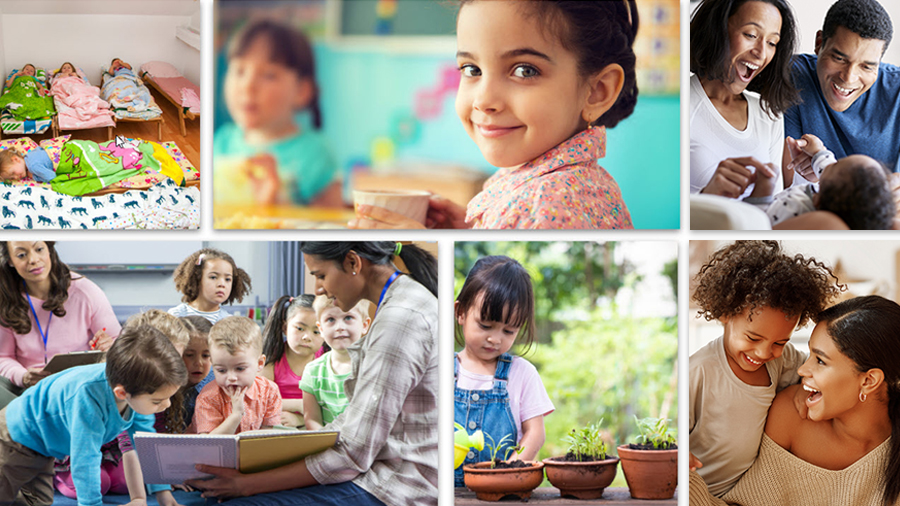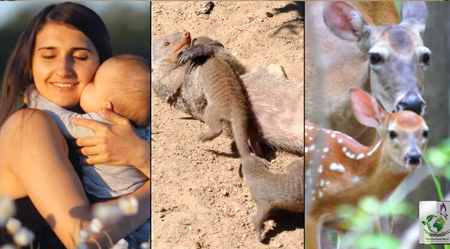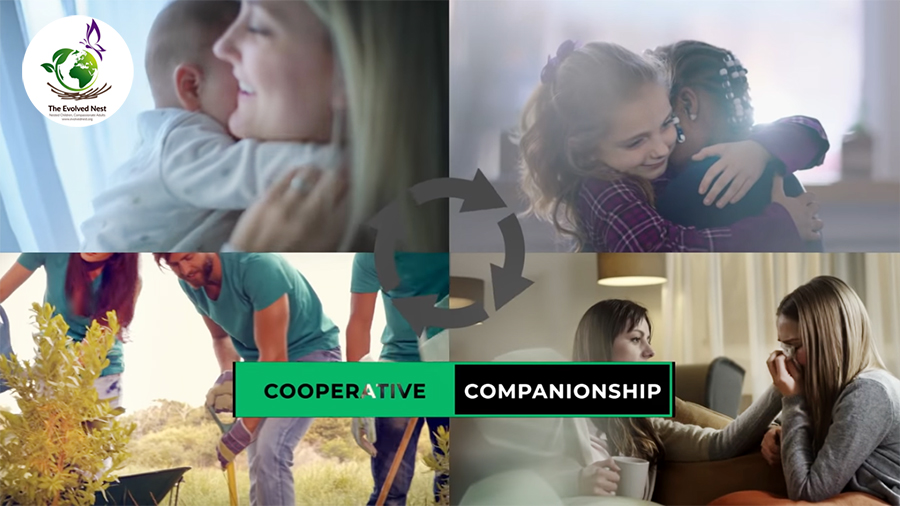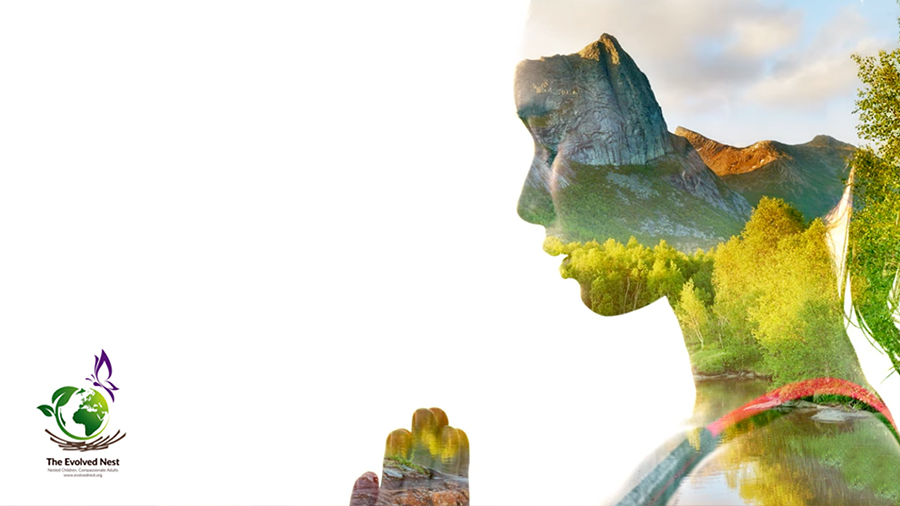The Evolved Nest: Nature’s Way of Raising Children
From the immense Whale to the intriguing Octopus – all Animals share with humans brain structures and processes that give us the capacities for life’s rainbow of experiences: consciousness, thinking, feeling, loving, and dreaming.
The Evolved Nest
Perhaps most importantly, we share common ways of raising our young: what is called the evolved nest. Evolved nests are practices that nurture physical and psychological wellbeing. Each child is “nested” with mother, family, community, and the rest of Nature as one seamless whole. Passed from generation to generation over millions of years, each Animal’s nest has been perfected to meet and match the needs of their young. Nestedness is evolution’s way of ensuring that everyone thrives. Each Animal’s evolved nest shares basic similarities but also unique differences.
The Evolved Nest: Nature’s Way of Raising Children is complimented by two other short films: Reimagining Humanity and Breaking the Cycle. These films are complimented by the acclaimed book, The Evolved Nest, by Darcia Narvaez and G.A. Bradshaw.
SHORT FILMS
Breaking the Cycle
Illustrates our capacity for breaking our current Cycle of Competitive Detachment and returning to the pattern of 95% of our human history: a healthy, peaceful Cycle of Cooperative Companionship. Breaking the Cycle is based on the multi-award-winning book, Neurobiology and the Development of Human Morality: Evolution, Culture and Wisdom, by Darcia Narvaez, PhD.
BreakingTheCycleFilm.org
Reimagining Humanity
The goal of this moving and inspirational 12-minute film is to expand human imagination, based in deep history and transdisciplinary science, about human potential. We have not always been so stressed, disconnected and mindlessly destructive. For most of our species’ existence we have lived in cooperative companionship. The film illustrates what this looks like.
ReimaginingHumanity.org
RESOURCES
Self-Directed Curriculum

The Evolved Nest is a breakthrough concept that integrates findings across fields that bear on child development, child raising and adult behavior. Evolved Nest provision in early life promotes optimal health and wellbeing, cooperation, and receptive and sociomoral intelligences. Societal moves away from providing the Evolved Nest to young children have contributed to the ill being and dysregulation we see in one another and society. To turn away from human self and planetary destruction, we must restore evolved nest provision to young children. But we all need to be nested to foster and maintain our cooperative nature.
Self-Directed Curriculum: Do you wonder why humanity is so miserable and destrucREive? Do you wonder what we can do to remedy the situation? Then this module is for you.
www.evolvednest.org/2024-learning-module
Care Checklist
Child Care Center Checklist > www.evolvednest.org/childcare-checklist
We are excited to unveil Evolved Nest’s Child Care Center Checklist. The Checklist has been created to help parents and guardians determine how well a child care center matches up with the components of the Evolved Nest. The checklist is intended to be supplemental to the other protocols a center has (e.g., infection prevention, abuse prevention, diaper change frequency). Please share widely. Download PDF

OPEN ACCESS (FREE) ARTICLES
Narvaez, D. (2017).
Getting back on track to being human.
Interdisciplinary Journal of Partnership Studies, 4(1), March 2, 2017.
Narvaez, D., & Witherington, D. (2018).
Getting to baselines for human nature, development and wellbeing.
Archives of Scientific Psychology, 6 (1), 205-213.
Tarsha, M., & Narvaez, D. (2019).
The Evolved Nest: A partnership system that fosters child wellbeing.
International Journal of Partnership Studies, 6(3).
Narvaez, D., Woodbury, R., Gleason, T., Kurth, A., Cheng, A., Wang, L., Deng, L., Gutzwiller-Helfenfinger, E., Christen, M., & Näpflin, C. (2019).
Evolved Development Niche provision: Moral socialization, social maladaptation and social thriving in three countries.
Sage Open, 9(2).
Narvaez, D., Gleason, T., Tarsha, M., Woodbury, R., Cheng, A., Wang, L. (2021).
Sociomoral temperament: A mediator between wellbeing and social outcomes in young children.
Frontiers in Psychology, 12, 5111.
Tarsha, M., & Narvaez, D. (2023).
The Evolved Nest, oxytocin functioning and prosocial development.
Frontiers in Psychology, 14:1113944.
BOOKS
Narvaez, D., & Bradshaw, G.A. (2023).
The Evolved Nest: Nature’s Way Of Raising Children And Creating Connected Communities.
North Atlantic Books.
Topa, Wahinkpe (Four Arrows), & Narvaez, D. (2022).
Restoring the kinship worldview: Indigenous voices introduce 28 precepts for rebalancing life on planet earth.
North Atlantic Books.
Narvaez, D. (2014).
Neurobiology and the development of human morality: Evolution, culture and wisdom.
Norton.
Narvaez, D., Panksepp, J., Schore, A., & Gleason, T. (Eds.) (2013).
Evolution, early experience and human development: From research to practice and policy.
Oxford University Press.
Narvaez, D., Braungart-Rieker, J., Miller, L., Gettler, L., & Hastings, P. (Eds.). (2016).
Contexts for young child flourishing: Evolution, family and society.
Oxford University Press.
Narvaez, D., Valentino, K., McKenna, J., Fuentes, A., & Gray, P. (Eds.) (2014).
Ancestral landscapes in human evolution: Culture, childrearing and social wellbeing.
Oxford University Press.

 Play Video
Play Video
 Play Video
Play Video
 Play Video
Play Video